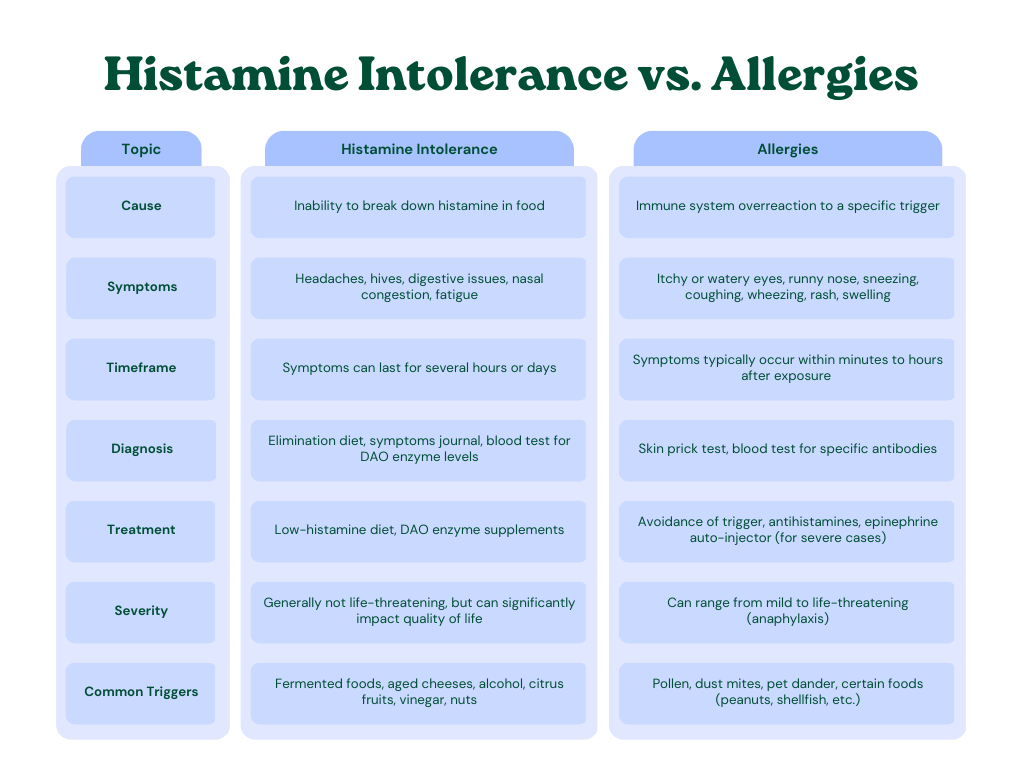
Histamine Intolerance and Allergies: What's the Connection?
Histamine intolerance and allergies are two conditions that can cause similar symptoms but have different underlying causes. Histamine intolerance is a condition where your body has difficulty breaking down histamine, a compound found in many foods, which can lead to a buildup of histamine in your body. On the other hand, allergies are an immune system response to a specific trigger, such as pollen or certain foods.
To explain the difference, think of histamine intolerance as a traffic jam. The roads (your body) are clear, but there are too many cars (histamine) on the road, causing congestion and slow-moving traffic (symptoms). Allergies, on the other hand, are like a roadblock. There’s a specific obstacle (the allergen) that’s blocking the road (your immune system), causing a complete shutdown of traffic (severe allergic reaction).
By understanding the difference between these two conditions, you can better identify the underlying cause of your symptoms and seek appropriate treatment. In this article, we’ll explore the connection between histamine intolerance and allergies and how they differ.

What is Histamine Intolerance?
Histamine intolerance is a condition where the body is unable to properly break down histamine, a chemical compound found naturally in many foods. When histamine builds up in the body, it can cause a range of symptoms, including headaches, flushing, hives, digestive issues, and more. These symptoms can be similar to an allergic reaction, but histamine intolerance is not the same as a true allergy.
What are Allergies?
Allergies are an immune response triggered by exposure to a specific substance, such as pollen, pet dander, or certain foods. In an allergic reaction, the immune system overreacts and produces antibodies called immunoglobulin E (IgE) to fight off the perceived threat. This leads to the release of histamine and other chemicals that cause symptoms like itching, swelling, and difficulty breathing.
What’s the Connection?
Histamine is involved in both histamine intolerance and allergies. In fact, histamine is a key player in the immune response that occurs during an allergic reaction. When the body detects an allergen, it releases histamine as part of the inflammatory response. This is what causes many of the familiar allergy symptoms, such as itchy eyes, sneezing, and runny nose.
People with histamine intolerance may also experience allergy-like symptoms, but the triggers are different. Histamine intolerance symptoms are triggered by the consumption of foods high in histamine or those that cause the body to release more histamine. Common trigger foods include aged cheeses, fermented foods, cured meats, and alcohol. In addition to food triggers, certain medications, environmental factors, and underlying medical conditions can also contribute to histamine intolerance symptoms.

How to Differentiate Between Histamine Intolerance and Allergies
Because histamine intolerance and allergies share some symptoms, it can be difficult to tell them apart. However, there are a few key differences that can help differentiate between the two conditions.
First, the symptoms of histamine intolerance tend to be more chronic and long-lasting, while allergic reactions tend to be more immediate and acute. For example, a histamine intolerance headache may persist for hours or even days, while an allergy headache may occur suddenly and subside within an hour or two.
Second, histamine intolerance symptoms are often triggered by specific foods or environmental factors, while allergies tend to be triggered by exposure to specific allergens. If you notice that your symptoms occur after consuming certain foods or drinks, it may be a sign of histamine intolerance.
Lastly, allergy symptoms tend to be more severe and can lead to life-threatening reactions in some cases, while histamine intolerance symptoms are usually less severe and do not pose as much of a risk.
Conclusion
While histamine intolerance and allergies share some similarities, they are distinct conditions with different triggers and symptoms. Understanding the differences between the two can help you identify the underlying cause of your symptoms and seek appropriate treatment. If you suspect that you may have histamine intolerance or allergies, talk to your healthcare provider to get a proper diagnosis and develop a personalized treatment plan.
Recommended
- All Post
- FODMAP
- Gut Health
- Histamine Intolerance



